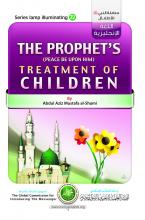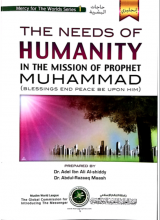The Prophet of Mercy Website
Muslim World League - Global Commission for Introducing the Messenger
Muhammad (peace be upun him) defended human rights for males and females, young and old, regardless of social status. He established a set of sublime principles; a prime example being in the speech he (peace be upun him) delivered during his farewell pilgrimage wherein he (peace be upun him) declared strict prohibition of transgression against people's lives, property and honor. These principles he laid down long before the world knew of the Magna Charta of 1215, the Declaration of Rights of 1628, the Personal Freedoms Law of 1679, the American Declaration of Independence of 1776, the Human and Citizen Rights Charter of 1789 or the worldwide Declaration of Human Rights of 1948.
The principles of human rights established by the Islamic Shari`ah (legal system) preceded all other human rights declarations by many centuries, and extended protection to animals, plants and the general environment as one of the branches of faith. Prophet Muhammad (peace be upun him) stated,
"Faith is seventy some branches, the highest of which is [witnessing] that there is no deity [worthy of worship] but Allah and the least of which is the removal of something harmful from the road."
Similarly, he prohibited relieving oneself in shady places where people stop to rest. Some other general rulings in this area are:
1. Protection of Human Life – Islam introduced such legislation as:
Prohibition of taking a life without legal right, regarding it as grave a sin as the killing of all mankind. Allah said in the Qur'an:
"Whoever kills a soul unless for a soul or for corruption [done] in the land – it is as if he had slain mankind entirely. And whoever saves one – it is as if he had saved mankind entirely." (5:32)
Prohibition of suicide – The Prophet (peace be upun him) said,
"Whoever kills himself by throwing himself from a mountain will be throwing himself from it in the Hellfire eternally, and whoever kills himself by drinking poison will have the poison in his hand, drinking it in the Hellfire."
Prevention of the means that lead to killing – The Prophet (peace be upun him) said,
"Whoever points a weapon at us is not from among us.”
Prohibition of threat and terrorism, even in jest.
Prohibition of harm, even potential harm – The Prophet (peace be upun him) ordered those who passed through a marketplace carrying arrows to cover them to prevent injury. He (peace be upun him) said,
"Whoever passes through one of our mosques or markets with arrows should hold them at their heads to let no Muslim be wounded by him."
The prophetic sayings prohibiting harm and ordering its cessation are numerous, such as:
"Whoever points a sword at his brother, the angels curse him, even if it should be his brother from his father and mother."
And he considered refraining from harming others to be among the rights of [those on] the road which a Muslim is obligated to respect.
2. Protection of the Mind
Prohibition of whatever corrupts the mind physically, as when the Prophet (peace be upun him) said,
"Every intoxicant affects the mind and everything that affects the mind is forbidden."
And prohibition of whatever corrupts the mind mentally, such as doctrines of superstition, hoaxes, blind imitation of others or refusal to reason logically.
3. Protection of Lineage
Encouragement of marriage – The Prophet (peace be upun him) said,
"O company of youths, whoever of you is able to marry should marry."
Prohibition of killing children and of abortion – Allah said:
"And do not kill your children." (17:31)
Islam forbade the killing of a fetus or aborting it unless there is a definite danger to the mother's life.
4. Protection of Chastity and Honor
Prohibition of fornication and adultery with confirmation of a legal punishment for it – Allah said:
"And do not approach unlawful sexual intercourse. Indeed, it is ever an immorality and is evil as a way." (17:32)
And He said: "The woman or man found guilty of fornication – lash each one of them with a hundred lashes." (24:2)
Prohibition of false accusation with confirmation of punishment for it – Allah said:
"Indeed, those who [falsely] accuse chaste, unaware and believing women are cursed in this world and the Hereafter; and they will have a great punishment." (24:23)
And He said:
"And those who accuse chaste women and then do not produce four witnesses – lash them with eighty lashes and do not accept from them testimony ever after. And those are the defiantly disobedient." (24:4)
And the Prophet (peace be upun him) said,
"Avoid the seven major sins," and mentioned among them the false accusation of chaste, unaware, believing women.
Instructing the avoidance of suspicious situations so that conduct and morals will not be suspect.
5. Protection of Property
Enjoinment of moderation in spending - Allah, the Mighty and Majestic said:
"And do not make your hand [as] chained to your neck [refusing to spend] or extend it completely [being extravagant] and thereby become blamed and insolvent." (17:29)
Legislative measures concerning transgression against people's wealth and property
Commandments to guard the properties of orphans and weak members of society
Prohibition of interest, usury and taking the wealth of others under false pretenses
6. Upholding the Honor of Women
Strong advocation by the Prophet (peace be upun him) for the care of women – Numerous instructions were given by him in this regard, such as his saying,
"You are advised to be good to women," and, "The best of you are the best of you to their wives, and I am the best of you to my wives."
Affirmation that women are equal in humanity to men – The Prophet (peace be upun him) said,
"Women are the sisters of men."
Participation of women with men in religious rites and social work – Allah said:
"The believing men and believing women are allies of one another. They enjoin what is right, forbid what is wrong, establish prayer, give zakah, and obey Allah and His Messenger. Those – Allah will have mercy upon them. Indeed, Allah is Exalted in Might and Wise." (9:71)
Granting women the right to learning and education – several sources confirm that an educated woman among the companions taught writing to the Prophet's (peace be upun him) wife, Hafsah bint Umar. His acknowledgement of that points to his approval of women's education since he made his own household a practical example for others.
Granting women financial rights – Islam established for them the right to inheritance and gave them preference over men in their right to a marriage dowry and maintenance, even when wealthy. It also upheld their right to buy, sell, rent and to give gifts and charities.
******






